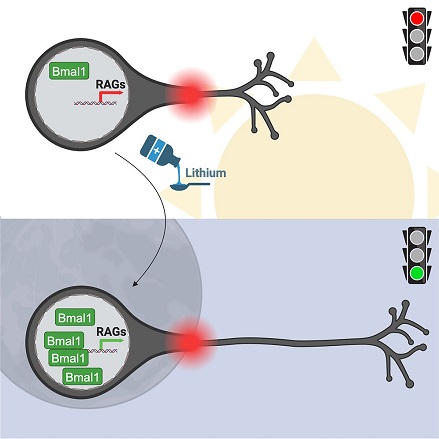Medical News: Swiss And British Scientists Discover That Axonal Regeneration And Repair Is Regulated By The Circadian Clock!
Nikhil Prasad Fact checked by:Thailand Medical News Team Nov 25, 2023 2 years, 2 months, 1 week, 3 days, 4 hours, 21 minutes ago
Medical News: Peripheral Nervous System (PNS) injuries often result in permanent neurological disability, as the regenerative ability of axons is inherently limited. While previous research has shed light on injury-dependent and -independent mechanisms influencing axonal regeneration, a comprehensive understanding of the molecular processes involved has remained elusive. In a groundbreaking study covered in this
Medical News report, conducted by scientists from the Department of Brain Sciences at Imperial College London, UK, and the University of Geneva, Switzerland, the circadian clock has emerged as a crucial regulator of axonal regeneration and repair.
 Study Abstract
Identification of Circadian Rhythms as a Common Regulator
Study Abstract
Identification of Circadian Rhythms as a Common Regulator
The researchers conducted a comparative analysis of transcriptomic datasets associated with neuronal regenerative ability, encompassing various models and conditions. Surprisingly, "circadian rhythms" emerged as the most significantly enriched pathway.
Circadian rhythms are molecular time-keeping mechanisms with approximately 24-hour cycles, governing physiological and behavioral changes in response to daily environmental stimuli. Despite their pervasive influence on various biological processes, their role in axonal regeneration had remained unexplored.
Time-of-Day-Dependent Axon Regeneration
The study focused on dorsal root ganglia (DRG) neurons, revealing that they possess an intrinsic molecular clock machinery crucial for timing and optimizing axonal regeneration. Using a mouse model of sciatic nerve injury, the researchers demonstrated diurnal oscillations in the regenerative ability of sensory neurons. Importantly, the transcriptomic analysis revealed a time-of-day-dependent enrichment for processes associated with both axonal regeneration and the circadian clock.
Key Molecular Players: Bmal1 and Regenerative Program
The researchers pinpointed the core clock protein Bmal1 as a key regulator of circadian axonal regeneration. Conditional deletion experiments confirmed that Bmal1 is essential for the intrinsic circadian regulation of neuronal regeneration and target re-innervation. The injury, performed at ZT20 (zeitgeber time 20), induced a regenerative transcriptional program dependent on circadian rhythms, emphasizing the intricate interplay between the circadian clock and axonal regeneration.
Chrono-Active Drugs: Repurposing Lithium for Nerve Repair
In an interesting application of their findings, the researchers explored the potential of chrono-active drugs in promoting axonal regeneration. Lithium, a known ch
rono-active drug used in clinics for treating neurological disorders, was identified as a compound that could enhance nerve regeneration in wild-type mice. This discovery opens up new possibilities for the repurposing of existing drugs and the development of novel compounds that target clock pathways for nerve repair.
Clinical Implications and Future Directions
The study's findings have significant implications for the development of targeted therapies and neurorehabilitation strategies for individuals with PNS injuries. The concept of timed therapies, utilizing the inherent circadian rhythms of the body, represents a novel approach to improving nerve repair. This insight into the circadian regulation of axonal regeneration opens avenues for the design of clock-dependent regenerative therapies tailored to specific time windows of the day.
Conclusion
The collaboration between Swiss and British scientists has unveiled a previously unrecognized role of the circadian clock in regulating axonal regeneration and repair. This groundbreaking discovery not only deepens our understanding of the molecular mechanisms governing nerve repair but also introduces the concept of timed therapies and neurorehabilitation for individuals with PNS injuries. The potential repurposing of chrono-active drugs, such as lithium, offers a promising avenue for future clinical interventions. As the scientific community continues to unravel the intricate relationship between circadian rhythms and neuronal regeneration, the prospect of personalized and time-sensitive treatments for nerve injuries comes closer to reality.
The study findings were published in the peer reviewed journal: Cell Metabolism.
https://www.sciencedirect.com/science/article/abs/pii/S1550413123003819
For the latest
Medical News, keep on logging to Thailand Medical News.
